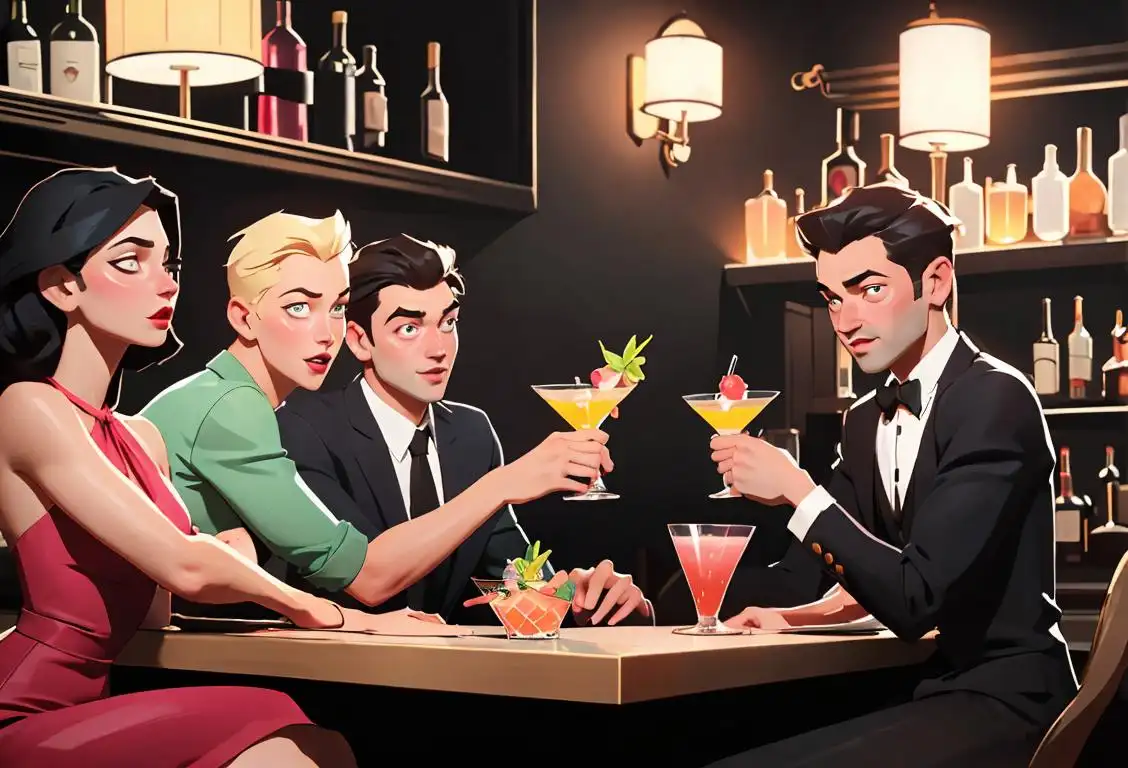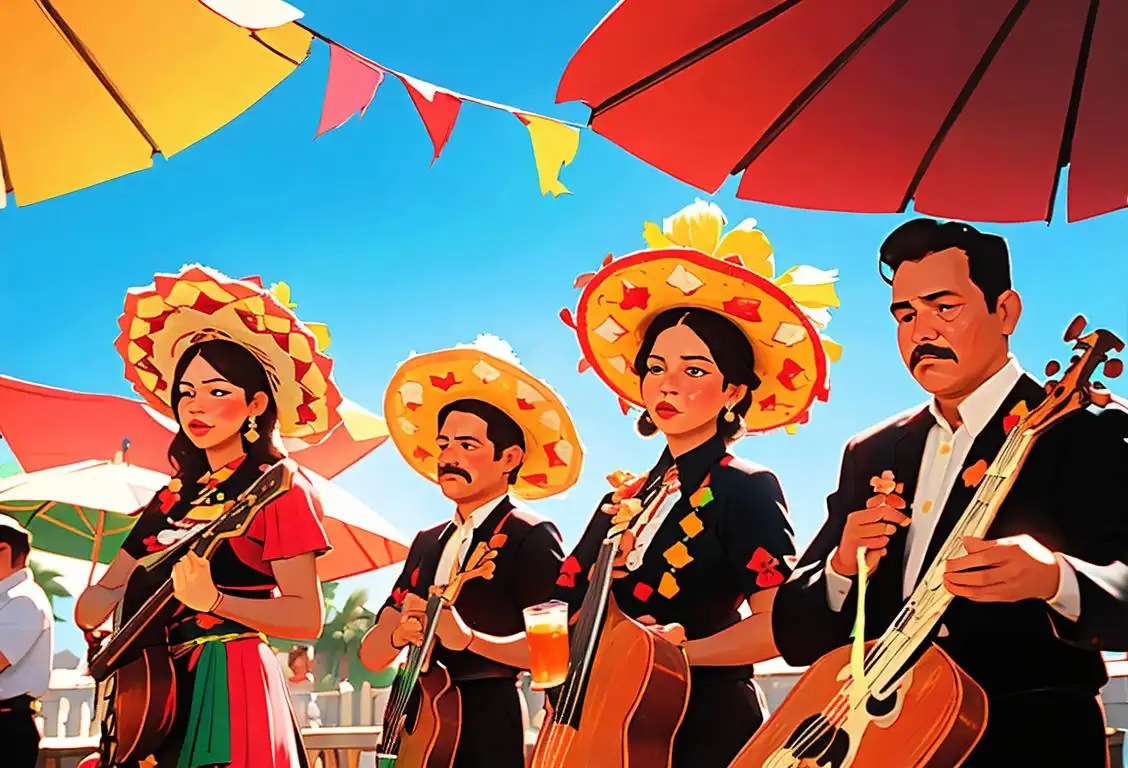National Liquor Day

Welcome to the wacky world of National Liquor Day! Get ready to raise your spirits and have a blast celebrating this boozy occasion. Whether you fancy a well-mixed cocktail, a smooth glass of wine, or a straight-up shot of your favorite liquor, this day is all about indulgence and good times. So, grab your favorite drink, sit back, and let's dive into the intoxicating history of National Liquor Day.
When is Liquor Day?
It's national liquor day on the 16th October.
The Origins of National Liquor Day
Like the swirling ice cubes in your glass, the origins of National Liquor Day are a bit hazy. Its exact beginnings are shrouded in mystery, but one thing is clear - people love to raise a glass on this special day.
Historical records show that humans have been imbibing alcoholic beverages for thousands of years. From ancient civilizations to modern times, alcohol has played a significant role in social gatherings, celebrations, and even religious rituals.
While the origins of National Liquor Day may be uncertain, what matters is the joy it brings to countless liquor enthusiasts across the world. It's a day to appreciate the art of mixology, toast to friendships old and new, and savor the flavors that make our taste buds tingle.
History behind the term 'Liquor'
13th century
Introduction of 'liqueur'
The term 'liqueur' originated in the 13th century in France, derived from the Latin word 'liquifacere' meaning 'to liquefy'. Initially, 'liqueur' referred to any alcoholic beverage that was made through the process of distillation. These beverages were often sweetened and flavored with herbs, fruits, or spices.
1200 BC
Ancient Nectar
Liquor has a long and rich history, dating back to ancient times. The term originates from the Latin word 'liquor', which means 'to be fluid' or 'to be liquid'. In ancient Babylonia, around 1200 BC, the Babylonians were known to make a fermented drink from dates, honey, and water. This sweet concoction can be considered one of the earliest forms of liquor.
9th Century AD
Arabic Alchemists
During the Islamic Golden Age in the 9th century AD, Arabic alchemists made significant advancements in the field of distillation. They developed apparatuses like alembics, which helped in the production of distilled spirits. The term 'liquor' started being associated with these concentrated alcoholic beverages produced through distillation, as they were considered to have exceptional potency and strength.
16th century
Distinct usage of 'liquor'
By the 16th century, the term 'liquor' started to acquire a more specific meaning. It referred to a concentrated and distilled alcoholic beverage. In contrast to 'liqueur', 'liquor' was not necessarily sweet or flavored but could be a pure and colorless spirit. This usage aimed to distinguish unflavored spirits from the sweetened and flavored 'liqueurs' of the time.
14th Century
The French Connection
In the 14th century, the term 'liquor' became more commonly used in Europe. The French word 'liqueur' emerged, which referred to a range of sweetened alcoholic beverages with different flavors. These liqueurs gained popularity in European courts and were often enjoyed as aperitifs or digestifs. The term 'liquor' was now firmly associated with these flavorful and often medicinal beverages.
17th century
Wider acceptance of 'liquor'
During the 17th century, 'liquor' gained broader acceptance as a term to describe both distilled alcoholic beverages and fermented beverages. It became a more encompassing term that covered various types of alcoholic drinks, including spirits, wines, and ales. This usage further solidified the term's association with the alcoholic beverage industry.
18th century
Global adoption and evolving nuances
In the 18th century, the term 'liquor' became widely adopted globally. Different countries and regions began to have nuanced interpretations of the term, reflecting their local drinking cultures. For instance, in the United States, 'liquor' typically referred to distilled spirits, particularly whiskey, while in Britain, it encompassed both spirits and non-distilled alcoholic beverages.
18th Century
American Libations
As European settlers migrated to America in the 18th century, they brought along their knowledge and love for liquor. Distilleries began to thrive, producing various types of spirits such as rum, whiskey, and brandy. The term 'liquor' became widely used in America to encompass all distilled alcoholic beverages. The popularity of these spirits grew rapidly, contributing to the cultural fabric and early American drinking traditions.
20th century
Legal and commercial significance
During the 20th century, the term 'liquor' gained legal and commercial significance. It became a key term used in regulations, trade, and marketing related to alcoholic beverages. Governments established specific guidelines and restrictions for the production, sale, and consumption of 'liquor', contributing to its formal definition within legal frameworks.
1920
Prohibition's Impact
The term 'liquor' took on a whole new meaning during the Prohibition era in the United States, which lasted from 1920 to 1933. The sale, production, and distribution of alcoholic beverages were prohibited, causing an underground market for illegal liquor to flourish. Terms like 'bootlegging' and 'moonshine' became associated with homemade liquor, often of dubious quality and potency. Prohibition left a lasting impact on the culture and perception of liquor in America.
Present
Contemporary usage and cultural impact
In the present day, 'liquor' remains a widely recognized term for alcoholic beverages. Its usage continues to evolve with cultural shifts and the emergence of new drinks. The term has permeated popular culture, appearing in literature, films, and music, contributing to its ongoing significance and cultural impact.
Did you know?
Did you know that the term 'liquor' comes from the Latin word 'liquor', which means 'liquid'? It's no wonder why we refer to our favorite alcoholic beverages as 'liquor'!Tagged
fun celebration beveragesFirst identified
20th April 2015Most mentioned on
16th October 2015Total mentions
368Other days
Michelada Day
Liquor Day
Coffee Beer Day
Fitness Day
Vodka Day
Friend Day
Video Game Day
Love Your Pet Day
Bestfriends Day
Heroes Day








